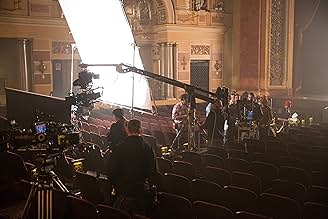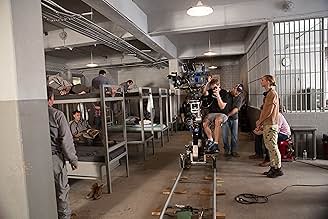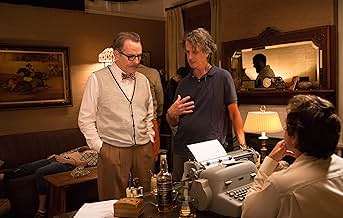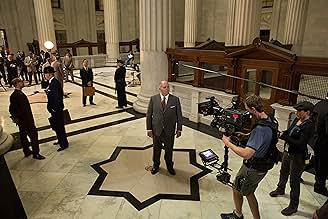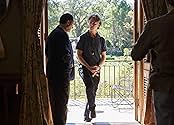In 1947, Dalton Trumbo was Hollywood's top screenwriter, until he and other artists were jailed and blacklisted for their political beliefs.In 1947, Dalton Trumbo was Hollywood's top screenwriter, until he and other artists were jailed and blacklisted for their political beliefs.In 1947, Dalton Trumbo was Hollywood's top screenwriter, until he and other artists were jailed and blacklisted for their political beliefs.
- Nominated for 1 Oscar
- 8 wins & 45 nominations total
Toby Nichols
- Chris Trumbo (age 6-10)
- (as Tobias McDowell Nichols)
- Director
- Writers
- All cast & crew
- Production, box office & more at IMDbPro
Featured reviews
I've seen some mixed reviews of Trumbo, and in a way I can understand why it wouldn't impress some film critics. It is a movie where the movie business, and especially movie personalities, are given over to actors to play. It's not unlike a few years ago with the Anthony Hopkins Hitchcock: you got a big cast and they all have roles to play from people who, if you're a big movie buff (or even someone who just knows who Kirk Douglas or John Wayne were, and that's probably a lot, whether or not you know who Dalton Trumbo was entirely), there's an aspect of 'Oh, he's or she is playing HIM or HER!' But I think with a sharp enough script that sort of thing goes by the way-side, especially if it gives the right actors some good stuff to play. There's nothing about Trumbo that is especially complex, as it has the message that most of us in 2015 would agree with: the Hollywood Blacklist, not just what happened to the Hollywood 10 but many others, was a horrible thing, and the thesis comes down to the idea that there were good and bad people in it but it also came down to the nature of it all making people victims... well, except for Hedda Hopper.
The movie is fun though whether or not you know a lot about the history because of who is in the cast and especially Bryan Cranston as Trumbo. He's a man who makes a lot of money in the 40's in Hollywood writing scripts and yet is an avowed Communist (he makes the case to his daughter in such a way early on in the film that some might question but most of us would go 'huh, that's it then'). A lot of the conflict comes because of what the history had right there: HUAC went after people in Hollywood who were suspected 'traitors', but in reality were just writers and (some) actors and directors who had affiliations with the party, and thanks to pressure by columnist Hedda Hopper (played here by Helen Mirren in a role that's deliciously evil) and John Wayne (actor I can't remember but does a good impression without being caricature-ish), a group got pressured. They didn't name names, were held in contempt of court, found guilty and did time. Well, unless if you were Edward G. Robinson (though he's shown in a somewhat sympathetic light, maybe just by Michael Stuhlbarg being in the role).
The bulk of the story is about the 'front' that Trumbo led for himself and other blacklisted writers such as stubborn/cancer-ridden Arlen Hird (Louis CK, always a pleasure to watch, but especially in scenes with Cranston). They used fake names to get their scripts made, even as they had no choice for a while but to team up with filmmakers who were out to just make "crap" (an echo in a way for me of Burton's Ed Wood with the John Goodman character). There's some predictable drama that unfolds - the all-business-all-writing part of Dalton that conflicts with being a father and family-man and clashing with his daughter and wife (very good Elle Fanning and Diane Lane respectively) - but what helps it along all the way is just a sharp script and direction that keeps things thematically strong.
This is serious stuff what happened to these people in Hollywood, and director Jay Roach and writer John McNamara know that, all the way up to a final speech from Trumbo upon winning a WGA award that puts things into a perspective that (almost) makes Trumbo too fair to those who really wronged him and his friends. But it's just full of wit an clever lines; if you're a sucker for that, as I can be sometimes, then Trumbo makes for a balance of the light and dark stuff. Again if nothing else, Cranston makes someone who can easily be seen as a CHARACTER in bold letters (and by many accounts that is who Trumbo was) and gives him three dimensions and perspective on the situations that unfold. He does things that may be wrong and provocative, in both bad and good ways, and is told off enough that any of his short-comings become kind of charming. I could've spent more time with his Trumbo and been happy, especially in light of the history that unfolds here (i.e. Roman Holiday, Spatacus, Exodus, other productions like The Brave One).
The movie is fun though whether or not you know a lot about the history because of who is in the cast and especially Bryan Cranston as Trumbo. He's a man who makes a lot of money in the 40's in Hollywood writing scripts and yet is an avowed Communist (he makes the case to his daughter in such a way early on in the film that some might question but most of us would go 'huh, that's it then'). A lot of the conflict comes because of what the history had right there: HUAC went after people in Hollywood who were suspected 'traitors', but in reality were just writers and (some) actors and directors who had affiliations with the party, and thanks to pressure by columnist Hedda Hopper (played here by Helen Mirren in a role that's deliciously evil) and John Wayne (actor I can't remember but does a good impression without being caricature-ish), a group got pressured. They didn't name names, were held in contempt of court, found guilty and did time. Well, unless if you were Edward G. Robinson (though he's shown in a somewhat sympathetic light, maybe just by Michael Stuhlbarg being in the role).
The bulk of the story is about the 'front' that Trumbo led for himself and other blacklisted writers such as stubborn/cancer-ridden Arlen Hird (Louis CK, always a pleasure to watch, but especially in scenes with Cranston). They used fake names to get their scripts made, even as they had no choice for a while but to team up with filmmakers who were out to just make "crap" (an echo in a way for me of Burton's Ed Wood with the John Goodman character). There's some predictable drama that unfolds - the all-business-all-writing part of Dalton that conflicts with being a father and family-man and clashing with his daughter and wife (very good Elle Fanning and Diane Lane respectively) - but what helps it along all the way is just a sharp script and direction that keeps things thematically strong.
This is serious stuff what happened to these people in Hollywood, and director Jay Roach and writer John McNamara know that, all the way up to a final speech from Trumbo upon winning a WGA award that puts things into a perspective that (almost) makes Trumbo too fair to those who really wronged him and his friends. But it's just full of wit an clever lines; if you're a sucker for that, as I can be sometimes, then Trumbo makes for a balance of the light and dark stuff. Again if nothing else, Cranston makes someone who can easily be seen as a CHARACTER in bold letters (and by many accounts that is who Trumbo was) and gives him three dimensions and perspective on the situations that unfold. He does things that may be wrong and provocative, in both bad and good ways, and is told off enough that any of his short-comings become kind of charming. I could've spent more time with his Trumbo and been happy, especially in light of the history that unfolds here (i.e. Roman Holiday, Spatacus, Exodus, other productions like The Brave One).
Trumbo is a period piece set in the late 40s and early 50s, following the life of Dalton Trumbo, arguably the leader of the Hollywood 10 who stood up to congress over what they saw as the illegal investigation and censorship of people's beliefs and free speech during the Second Red Scare after WWII. At the time, Congress and, in turn, members of the Hollywood elite blackballed writers, actors, directors, etc who identified as communists. Not spies for Moscow, but communists by political belief. Some faced jail time. Some lost their homes because they could not find work. Others encountered harsher realities. And Hollywood witch-hunt was merely a small part of a more wide-spread affront to civil liberties.
The time period itself is difficult to portray without seeming to be caricature - or perhaps style and communication have changed so much in 65 years that it just seems like caricature. Added to that difficulty are portrayals of John Wayne and Kirk Douglas, legends of film that, as a young person, I may have gone my whole life subconsciously thinking of as only existing on screen. Trumbo mostly rises to the occasion.
Much of Trumbo is comedic, and with intention, but the film also carries a certain amount of poignancy, if maybe a little less than it could use given the subject matter. Bryan Cranston is incredibly enjoyable to watch, and during the credits you get to watch a clip of the real Trumbo to compare. The portrayal is jarringly realistic (something you may question for the entirety of the film). Helen Mirren is a worthy antagonist, and very effectively displays the fear and anger that result from war - the need to dehumanize the enemy in order to survive the loss you feel as your family is fighting thousands of miles across the world, the need to justify pain through rigid ideology.
Other notable performances come from Michael Stuhlbarg, whose character, Eddie, provides for much of the films poignancy, and Diane Lane as the quiet but strong Cleo Trumbo, the rock of her family. John Goodman, is well cast as the comedic used car salesman of film, and Elle Fanning makes her mark as the rebellious daughter learning to be every bit of a force as her father.
It would be unfair to pin the failings of the film on a single person, but Louis C. K. continues to prove that being a great comedian does not make you a great actor. His portrayal is, in fact, so flat that it pulls you out of immersion in the film, a flaw that is further exacerbated by Bryan Cranston's mastery. Scenes between the two are simply absurd.
As a whole, the film's laughs are well earned and its feelings are well felt. Where the film falls short is to evoke, without personal reflection, the so obvious parallels between the state of our country today and that of the film. But perhaps that is not the goal. Perhaps the goal was to, with a bit of fun, portray a larger than life writer who decided to take on the world...and won. In that, Trumbo is a great success.
The time period itself is difficult to portray without seeming to be caricature - or perhaps style and communication have changed so much in 65 years that it just seems like caricature. Added to that difficulty are portrayals of John Wayne and Kirk Douglas, legends of film that, as a young person, I may have gone my whole life subconsciously thinking of as only existing on screen. Trumbo mostly rises to the occasion.
Much of Trumbo is comedic, and with intention, but the film also carries a certain amount of poignancy, if maybe a little less than it could use given the subject matter. Bryan Cranston is incredibly enjoyable to watch, and during the credits you get to watch a clip of the real Trumbo to compare. The portrayal is jarringly realistic (something you may question for the entirety of the film). Helen Mirren is a worthy antagonist, and very effectively displays the fear and anger that result from war - the need to dehumanize the enemy in order to survive the loss you feel as your family is fighting thousands of miles across the world, the need to justify pain through rigid ideology.
Other notable performances come from Michael Stuhlbarg, whose character, Eddie, provides for much of the films poignancy, and Diane Lane as the quiet but strong Cleo Trumbo, the rock of her family. John Goodman, is well cast as the comedic used car salesman of film, and Elle Fanning makes her mark as the rebellious daughter learning to be every bit of a force as her father.
It would be unfair to pin the failings of the film on a single person, but Louis C. K. continues to prove that being a great comedian does not make you a great actor. His portrayal is, in fact, so flat that it pulls you out of immersion in the film, a flaw that is further exacerbated by Bryan Cranston's mastery. Scenes between the two are simply absurd.
As a whole, the film's laughs are well earned and its feelings are well felt. Where the film falls short is to evoke, without personal reflection, the so obvious parallels between the state of our country today and that of the film. But perhaps that is not the goal. Perhaps the goal was to, with a bit of fun, portray a larger than life writer who decided to take on the world...and won. In that, Trumbo is a great success.
All movie fans should recognize the name of Dalton Trumbo. Even if his heyday was a good half-century ago, his actions during one of Hollywood's very darkest periods still have tremendous impact even today. Especially today, for that matter.
Some quick background. You may recall that in World War II, the US and the Soviets were allies but that after the war we became distrustful adversaries. This time was known as the Cold War – since the two countries didn't fight one another – and really ended only in the late 1980s. Prior to the end of WW II, many Americans joined the Communist Party as a way to fight the rise of Fascism in Europe. After the war, current and former members of the Party were looked upon as pariahs of the highest order. Screenwriter Dalton Trumbo (Bryan Cranston) was one of these pariahs. It didn't help that he actively tried to rally technical workers on film sets (grips, lighting and sound technicians) to strike for higher pay. Unionizing was seen as a bad thing, despite the gains it had achieved for American workers earlier in the century.
Trumbo's membership in the Party wasn't a big deal at first, but then gossip columnist Hedda Hopper (Helen Mirren), who wielded an enormous amount of power in Hollywood, took it as a personal affront and used her column (and weekly appearance in newsreels) to denounce Communism in general and Trumbo in particular. Kicking the whole scandal into high gear was a little-known congressional group – the House Un-American Activities Committee. These guys tried to rout out Commies from Hollywood (which it saw as holding a lot of sway over Americans, much more so than today) by calling a group of known or suspected Communists to Washington for sworn testimony. These men were known as the Hollywood Ten. Trumbo was one of them, and he refused to tell the committee the names of anyone else who was or who could be a Communist. He, like his fellow Ten members, was found in contempt. Later, someone not in the group did name Trumbo, and he was put in prison for a full year.
When he got out, no one would hire him (or any of the others in the Ten). Except for King Brothers Studio, which couldn't pay him much. But Trumbo worked fast as both a writer of original stuff and a fixer of existing scripts. The Kings loved him. So much so that the others in the Ten were offered jobs (for no credit, same as Trumbo) working as script doctors. During this time, Trumbo also got work from some friendly sorts in the business by selling them a script but not taking on-screen credit; the credit typically went to a fictitious person, or to a willing accomplice – known as a front. Through this method, Trumbo won two writing Oscars – although no one knew it at the time.
Dalton Trumbo fought for himself, his fellow writers, and for anyone for whom the Bill of Rights holds any meaning. He reasoned that if people could be silenced for political beliefs, then anyone could be silenced for any reason. This is, unfortunately, still true today. And although he didn't receive credit at the time, Trumbo was awarded his Oscars eventually (one posthumously). He's recognized as being one of the very greatest screenwriters the world has ever known. The movie does a terrific job describing Trumbo's struggles – and that of his family: his wife Cleo (Diane Lane) and his three doting children. The toll that his stance took on them was noticeable to everyone except for Trumbo himself.
Cranston turns in what was an Oscar-nominated performance, but his was not the only one of note. Lane is superb as his suffering, strong better half. Elle Fanning, as his eldest daughter, is also a standout, as are John Goodman (as Frank King) and Alan Tudyk (as writer Ian McLellan Hunter). Spellbinding from start to finish, and all screenwriters owe Trumbo a huge debt of gratitude for his long struggle on their behalf.
Some quick background. You may recall that in World War II, the US and the Soviets were allies but that after the war we became distrustful adversaries. This time was known as the Cold War – since the two countries didn't fight one another – and really ended only in the late 1980s. Prior to the end of WW II, many Americans joined the Communist Party as a way to fight the rise of Fascism in Europe. After the war, current and former members of the Party were looked upon as pariahs of the highest order. Screenwriter Dalton Trumbo (Bryan Cranston) was one of these pariahs. It didn't help that he actively tried to rally technical workers on film sets (grips, lighting and sound technicians) to strike for higher pay. Unionizing was seen as a bad thing, despite the gains it had achieved for American workers earlier in the century.
Trumbo's membership in the Party wasn't a big deal at first, but then gossip columnist Hedda Hopper (Helen Mirren), who wielded an enormous amount of power in Hollywood, took it as a personal affront and used her column (and weekly appearance in newsreels) to denounce Communism in general and Trumbo in particular. Kicking the whole scandal into high gear was a little-known congressional group – the House Un-American Activities Committee. These guys tried to rout out Commies from Hollywood (which it saw as holding a lot of sway over Americans, much more so than today) by calling a group of known or suspected Communists to Washington for sworn testimony. These men were known as the Hollywood Ten. Trumbo was one of them, and he refused to tell the committee the names of anyone else who was or who could be a Communist. He, like his fellow Ten members, was found in contempt. Later, someone not in the group did name Trumbo, and he was put in prison for a full year.
When he got out, no one would hire him (or any of the others in the Ten). Except for King Brothers Studio, which couldn't pay him much. But Trumbo worked fast as both a writer of original stuff and a fixer of existing scripts. The Kings loved him. So much so that the others in the Ten were offered jobs (for no credit, same as Trumbo) working as script doctors. During this time, Trumbo also got work from some friendly sorts in the business by selling them a script but not taking on-screen credit; the credit typically went to a fictitious person, or to a willing accomplice – known as a front. Through this method, Trumbo won two writing Oscars – although no one knew it at the time.
Dalton Trumbo fought for himself, his fellow writers, and for anyone for whom the Bill of Rights holds any meaning. He reasoned that if people could be silenced for political beliefs, then anyone could be silenced for any reason. This is, unfortunately, still true today. And although he didn't receive credit at the time, Trumbo was awarded his Oscars eventually (one posthumously). He's recognized as being one of the very greatest screenwriters the world has ever known. The movie does a terrific job describing Trumbo's struggles – and that of his family: his wife Cleo (Diane Lane) and his three doting children. The toll that his stance took on them was noticeable to everyone except for Trumbo himself.
Cranston turns in what was an Oscar-nominated performance, but his was not the only one of note. Lane is superb as his suffering, strong better half. Elle Fanning, as his eldest daughter, is also a standout, as are John Goodman (as Frank King) and Alan Tudyk (as writer Ian McLellan Hunter). Spellbinding from start to finish, and all screenwriters owe Trumbo a huge debt of gratitude for his long struggle on their behalf.
9vsks
After practically having the frequently shown previews for Trumbo memorized, I finally saw the film itself. (Though one trailer scene with Helen Mirren didn't actually appear in the movie. Weird.) As you undoubtedly know, Trumbo is the story of the Hollywood 10, writers blacklisted during the communist witch-hunts of the late 1940s and 1950s. Joe McCarthy and all that. When called before the House Un-American Activities Committee, Dalton Trumbo (played beautifully by Bryan Cranston) and the other nine refused to give Congress information about their beliefs or to rat out others in the film industry. As a result, a number of them including Trumbo went to prison for contempt of Congress ("I AM contemptuous of Congress," he said after the HUAC hearing). He was in the slammer for 10 months and once he was out could no longer get work. Meanwhile, some industry personages—in the movie, producer Buddy Ross (Roger Bart) and actor Edward G. Robinson (Michael Stuhlbarg)—saw their careers going up in smoke and did testify (though in real life, Robinson did not name names). The movie effectively skewers that Great American Flag-Waving Hero, John Wayne, who managed to avoid any military service during World War II and Korea. "If you're going to act as if you won the war single-handedly," Trumbo tells him, "it would be more believable if you'd actually served," as he and so many of his black-listed colleagues had. They represent the tip of the iceberg of people harmed by the virulent anti-Communism of the day, and although the movie is about the Hollywood 10, it's really about the Hollywood One, Trumbo, the most accomplished of the lot. The composite character Arlen Hird has the unenviable job of being Trumbo's verbal sparring partner and representing an amalgam of several of the harder-line writers' views. Trumbo is unfailingly supportive of him, even though he inserts his political views into scripts (which Trumbo rewrites) and clearly doesn't trust Trumbo. (This is where the "You talk like a radical, but you live like a rich man" line from the trailer fits in.) While not a lot of acting was required of Diane Lane as Trumbo's wife, she did a fine job, and Helen Mirren is perfect as the odious Hedda Hopper, blackmailer without portfolio. As writer Hird, comedian Louis C.K.'s acting inexperience shows a bit, as he's up against such acting superstars, while John Goodman is all prickly geniality and Alan Tudyk plays a credible Ian McLellan Hunter. Hunter wins the Academy Award for the Roman Holiday script (the Gregory Peck, Audrey Hepburn classic), but Trumbo wrote it. In fact, Trumbo and the others write many screenplays for which they receive credit only belatedly, if at all. The back of the blacklist can't be broken until a few Hollywood luminaries are willing to give appropriate screen credit. Directed by Jay Roach with a solid script from John McNamara. While in their vision, the character of Trumbo doesn't change much over the course of the story—except perhaps to learn not to take what he most cherishes for granted—"he is no more or less principled at the end than he was at the start," said Anthony Lane in The New Yorker. He is forgiving, though, and in the end acknowledges that all humans are a mix of good acts and bad (except perhaps for Hedda Hopper). The real opportunity for learning lies with the audience. While those anti-Communist days may now seem rather quaint—Congress taking on a bunch of two-fingered typists—there always are people who believe they know best what other people should think, who believe others are too dim or inattentive to grasp hidden political messages, who think citizens are like children who have to be protected from difficult ideas. That, the movie Trumbo seems to say, is still the danger. Another film well worth the price of a ticket.
This is a well-made film, despite omitting some uncomfortable truths -- namely that Dalton Trumbo, while rightly fighting for free speech, also collaborated with the government to silence views he opposed.
Still, TRUMBO stands as a powerful indictment of McCarthyism and blacklisting -- one that feels uncannily relevant today. Those who mindlessly champion cancel culture might want to watch this film ... before they find themselves on the wrong end of the next punitive trend.
Still, TRUMBO stands as a powerful indictment of McCarthyism and blacklisting -- one that feels uncannily relevant today. Those who mindlessly champion cancel culture might want to watch this film ... before they find themselves on the wrong end of the next punitive trend.
Did you know
- TriviaBryan Cranston revealed in a radio interview that Kirk Douglas approved of this movie, but his major complaint was that he wasn't asked to play himself.
- GoofsWhen the Oscar is presented for Best Screenplay at the 1954 Awards the presenter says, "And the Oscar goes to..." This phrase was not used by presenters until the 61st Academy Awards in 1989. In the 1950s the presenter would have said, "And the winner is..." when presenting an Oscar.
- Quotes
Dalton Trumbo: Friends? What friends? Who the hell has the luxury of friends? I've got allies and enemies. There's no room for anything else.
- Crazy creditsAs the credit scroll begins, photos of Dalton Trumbo, his family, and other people portrayed in the film are shown. These are followed by historical footage of Trumbo giving an interview (from the same one where he acknowledges that he is 'Robert Rich').
- Alternate versionsThe version of the movie that has been screened on Indian theaters and telecast in India is a PG-13 level cut that has been rated UA by the CBFC.
Details
- Release date
- Country of origin
- Official sites
- Language
- Also known as
- Nhà Biên Kịch Trumbo
- Filming locations
- Production companies
- See more company credits at IMDbPro
Box office
- Budget
- $15,000,000 (estimated)
- Gross US & Canada
- $7,857,741
- Opening weekend US & Canada
- $74,177
- Nov 8, 2015
- Gross worldwide
- $11,430,025
- Runtime
- 2h 4m(124 min)
- Color
- Sound mix
- Aspect ratio
- 1.85 : 1
Contribute to this page
Suggest an edit or add missing content








